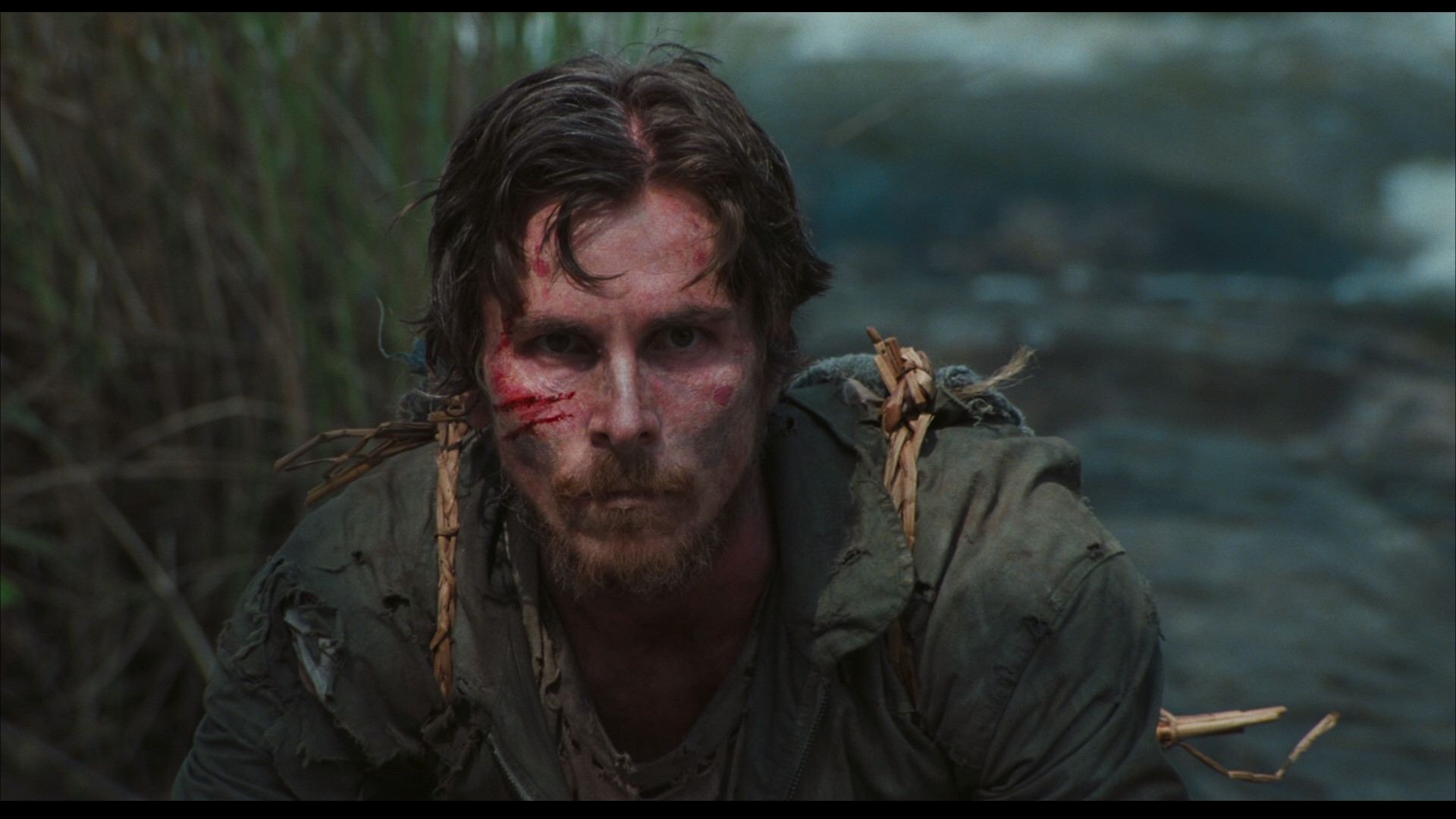Title/Year: Rescue Dawn; 2006
Director/Birth Country/Year Born: Werner Herzog; Germany; 1942
Budget: $10 million (estimated)
Gross: $7.2 million (worldwide)
Synopsis: A German-American pilot, Dieter Dengler, is shot down, captured, and taken to a prison camp. There he meets five other prisoners and plans a grand escape. Only Dieter and Duane Martin fully commit to the escape plan, and soon discover that the jungle is worse the the prison they were in. On their way to Thailand to escape Duane is killed. Eventually, Dengler is rescued by an American helicopter and hailed a hero when he returns to his ship.
Narrative and Visual Keywords: Vietnam, prisoner, bomber, crash, Navy, escape, plan, mental breakdown, rain, jungle, prison, rescue, rice, food, Pathet Lao, river, friendship, handcuffs, nail, fire, death
Characterization/ Dialogue: Dieter Dengler's character remains positive throughout the entirety of the film. It is almost an unatural kind of positive. Though it appears believable at times, it seems unreal for someone in the position that he is in.
Camera/lighting/editing technique: Very few scenes seem to be artificially lit. Night shots and interior shots seem to be the only ones. All the exterior shots seem to be naturally lit.
Political/ Social Commentary: The film doesn't state much in a political view. It does go in-depth in analyzing the human mind as it is pushed past the point of reason and sanity. This can be seen by looking at the fellow prisoners of Deiter, mainly Gene.
Historical Relevance/ Recognition: The movie is based on the true story of Dieter Dengler, a German-American pilot who was shot down and captured by the Pathet Lao. The story has one crucial difference in that while in the POW camp there are six prisoners, when in real life there where seven, but Herzog found six characters easier to manage..
Notable Collaboration: Werner Herzog directed the movie.
Random fact, Etc.: Where the actors had to loose weight for their roles Werner Herzog shed almost 30 pounds as a show of solidarity.
1. Is the soldier/veteran depicted as being in control of his destiny?
The soldier is depicted as being in control of his destiny. Throughout the film Dieter is the one who appears to be thinking with a level head, or have a continuous push of will power. Though the idea of escaping may not seem to be the best or easiest choice to survive a POW camp Dieter's first thoughts are about trying to escape, but not just for himself, for the other prisoners as well. Dieter is also the only prisoner who is pushing to making the living situation easier to survive. Dieter fashioning a nail into a temporary key for the handcuffs, the makeshift tools/weapons, and coming up with an escape plan are all examples of him taking his destiny into his own hands.
2. What political sub-text, or overt theme is the film exploring?
There isn't much of a political sub-text anywhere in this film. Surprising you might think, but true. The movie makes no opinion of the war being good or bad, but the film finds a different view to take. The film deals with the concept of the human mind and how far it can be pushed. The theme is about trying to maintain your sanity in an insane situation. From the moment he's captured Dieter is tortured, but still seems to maintain his positive outlook and optimistic view.
3. How are masculinity and patriarchy displayed through the main character(s) -- broken and dissociated or reinstated and productive.
Dieter displays that his masculinity and patriarchy is both reinstated and productive. Dieter displays his authority when Gene states that he will stop his fellow prisoners from escaping and Dieter counters by not releasing the prisoners from the handcuffs that night. At one point when the prisoners are in their hut Dieter tells Gene that he would have no problem killing him if he attempted to get in the way of the escape plan. The entirety of the jungle escape shows Dieter's masculinity as he fights off starvation, dehydration, enemies, death, and all this while motivating his fellow comrade Duane to stay moving despite how "tired" he feels.

Nice review of Rescue Dawn. I haven't had a chance to see this film myself, but reading your take on it has sparked my curiousity. I was hoping to hear what your thoughts were with regard to a possible political theme. Then again, with the film being made in 2006, perhaps there wasn't much in the way of such a theme.
ReplyDeleteI love the interesting fact about Herzog also losing weight himself during shooting. Great find. Thanks again for your thoughts.
I have yet to see Rescue Dawn as well. I generally love Werner Herzog's films. He made a doc called, "Little Dieter Needs to Fly" (1998) about this same subject, featuring the real Dieter Dengler.
ReplyDelete